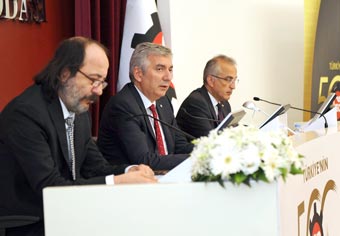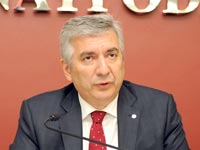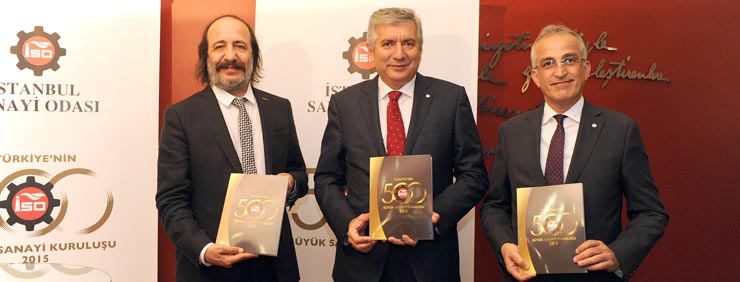ICI Publishes “2015 Türkiye's Top 500 Industrial Enterprises” Survey
- 07.06.2016
- News

Istanbul Chamber of Industry's (ICI) “Türkiye’s Top 500 Industrial Enterprises 2015 Survey” announced Tüpraş as the industry leader with TL 35,437 billion in production-based sales. The net production-based sales of the ICI Top 500 companies increased by 7 percent in 2015 to reach TL 450.5 billion.
Before announcing the ICI Top 500 Industrial Enterprises data, ICI Chairman Erdal Bahçıvan condemned the terrorist attacks which occurred that morning in Vezneciler. Revealing that industrialists' financial expenses skyrocketed by 75 percent according to ICI Top 500 data, Bahçıvan elaborated: “Industrialists lose 63.4 percent of their profit to financial expenses. Two third of their hard-earned income is spent as financial expenses. Banks are not happy about this as well. Such a model is unlikely to support a well-functioning industry."
Istanbul Chamber of Industry published the “Türkiye’s Top 500 Industrial Enterprises 2015 Survey”, a traditional work shaping the league of industrial giants since 1968. Announced by ICI Chairman Erdal Bahçıvan and Deputy Chairmans Adnan Dalgakıran and İrfan Özhamaratlı at a press conference, Türkiye’s Top 500 Industrial Enterprises 2015 Survey ranked Tüpraş first in production-based sales at TL 35.437 billion. Ford Otomotiv and Arçelik came second and third with TL 14.732 billion and TL 9.998 billion, respectively.

Erdal Bahçıvan, ICI Chairman
One of the most outstanding results of the survey, announced two months earlier than previous years and critical for capturing the current status of and challenges faced by the real economy, has been the 75 percent rise year-on-year in financial expenses. Accordingly, industrialists have lost 63.4 percent of their profit in financial expenses.
Industrial enterprises in the ICI Top 500 registered TL 450.5 billion in net production-based sales in 2015, rising by 7 percent from TL 421.2 billion in 2014. The operating profit to net sales ratio hit 8.7 percent, a record high in the recent years. The operating profit, TL 30.457 billion in 2014, rose by 44.9 percent to TL 44,144 billion.
The research indicates that the manufacturing industry has grown less than the average growth of the economy for the past four years, with the exception of 2014. In fact, in 2015, the overall economic growth was recorded as 4 percent, whereas the manufacturing industry grew by 3.8 percent.
Apart from this, exports of the ICI Top 500 enterprises dropped 12.9 percent, from USD 61.3 billion to USD 53.4 billion in 2015. In fact, as of 2015, ICI Top 500 Industrial Enterprises account for 37.2 percent of Türkiye's overall exports and 38.9 percent of industrial exports. The top five exporters have been listed as Ford Otomotiv, Tüpraş, Oyak Renault, Tofaş and Arçelik.
Erdal Bahçıvan, ICI Chairman, noted the uncommon jump in financial expenses in 2015 revealed by the study, and noted how industrialists spent the lion's share of their hard-earned operating profit on financial expenses. “Financial expenses grew by 75.1 percent year-on-year. Industrialists spend TL 28 billion out of their profits of TL 44 billion on financial expenses, which corresponds to 63.4 percent. The global ratio for public industrial enterprises, however, is at 16 percent. In other words, Türkiye does not differ from the rest of the world by its debt ratio, but by cost of borrowing. Almost two third of industrialists' earnings accumulated through hardwork, R&D, investment, creation of employment, and taking risks has been spent on financial expenses. This is neither acceptable, nor sustainable. The ratio of financial expenses to operating profit is well above world average, and it is impossible to maintain this finance system in Türkiye. Industrialists are not the only actors overburdened by such high financial expenses though. Banks, pillars of the finance, are not happy either. Such a model is unlikely to support a well-functioning industry," said Bahçıvan.
On how the survey unveiled Türkiye's need for writing a new story of economic growth through qualified production, ICI Chairman Erdal Bahçıvan said: “Given that the rest of the world has the internet of things on the agenda, and production has been undergoing a unique evolution via Industry 4.0, Türkiye must definitely change the current situation. Writing a success story on overcoming the middle income trap and readopting the production economy calls for improvement of our economic growth. The new story must be built on R&D, state-of-the-art products, design, and branding. This is how the growth will contribute to Türkiye in terms of quality and quantity.”
Speaking on the role of SMEs, the backbone of the economy in the new development model, Bahçıvan continued: “Our SMEs, which we will encourage to produce high-tech and high value added goods, will contribute to Türkiye’s qualified growth. The new government's statement of prioritizing “production economy” has given us hope in this respect. Industrialists, driven by the passion for production, employment, and export, are willing to play the lead role in this story.”

Stressing that Türkiye, unlike other countries, saw negative figures in terms of debt quality as well, Bahçıvan said: “The share of short-term debt to total financial debt was 25 percent globally, whereas ICI Top 500 recorded 39 percent. Likewise, the share of fixed assets to total assets was at 66 percent, compared to ICI Top 500's 46 percent. We are 20 points behind the average. This means that the global private sector borrows mostly to invest, into machine parks, technology, or long-term projects. In contrast, our companies spend it on stock-oriented working capital, which demonstrates the quality problem with regard to good use of these funds.”
The number of profit-makers decreased from 417 to 400 in 2015 year-on-year while 100 enterprises recorded losses, shows ICI Top 500 Industrial Survey results announced by ICI Chairman Erdal Bahçıvan. The absolute earnings before interest, tax, depreciation and amortization (EBITDA) grew by 23 percent to reach TL 62 billion. The number of enterprises making positive EBITDA figures dropped from 481 in 2014 to 476 in 2015.
In addition, the share of equities in total assets decreased to 39.9 percent, while the ratio of total debt to total assets moved up to 60.1 percent. Private enterprises, on the other hand, went down to 37 percent in terms of equity ratio while their debt ratio rose to 63 percent.
R&D expenditure reached TL 3.35 billion, up by 7 percent year-on-year. Yet, the ratio of R&D expenditure to production-based sales remained at 0.74 percent. The distribution of value added by companies' technology intensiveness turned out to be similar to that of 2014. The share of medium-low technology intensive industries in the value added generated increased to 39 percent, whereas that of low technology intensive industries and medium-high technology intensive industries decreased to 38.9 and 18.9 percent, respectively. High technology intensive industries, on the other hand, was stable at 3.2 percent. To sum up, the share of the value-added generated by ICI Top 500 Industrial Enterprises operating in medium-high and advanced technology intensive sectors was limited to 22.1 percent.
Employment at private companies among ICI Top 500 Industrial Enterprises increased by 3.8 percent to reach 601,696, while wage raises stood at 13.7, exceeding inflation rates. ICI Top 500 included 125 foreign invested enterprises last year, compared to 153 in 2009.
Top ten in ICI Türkiye’s Top 500 Industrial Enterprises (by Production-Based Sales)
| 1- | Tüpraş | TL 35,437 million |
| 2- | Ford Otomotiv | TL 14,732 million |
| 3- | Arçelik | TL 9,998 million |
| 4- | Oyak Renault | TL 9,893 million |
| 5- | Tofaş | TL 8,434 million |
| 6- | Elektrik Üretim A.Ş. (EÜAŞ) | TL 6,794 million |
| 7- | Ereğli Demir Çelik | TL 6,475 million |
| 8- | Hyundai Assan | TL 6,236 million |
| 9- | İskenderun Demir Çelik | TL 5,890 million |
| 10- | İçdaş Çelik | TL 5,773 million |